Laughter After Loss: How 'Dr. Laugh' Brings Joy
"Hashem didn't just make me short like a child for no reason, and with a sense of humor," claims Hananel Amitai, known as Dr. Laugh. Between performances and workshops, he shares his secret and explains how to make even the most indifferent among the audience burst into laughter.
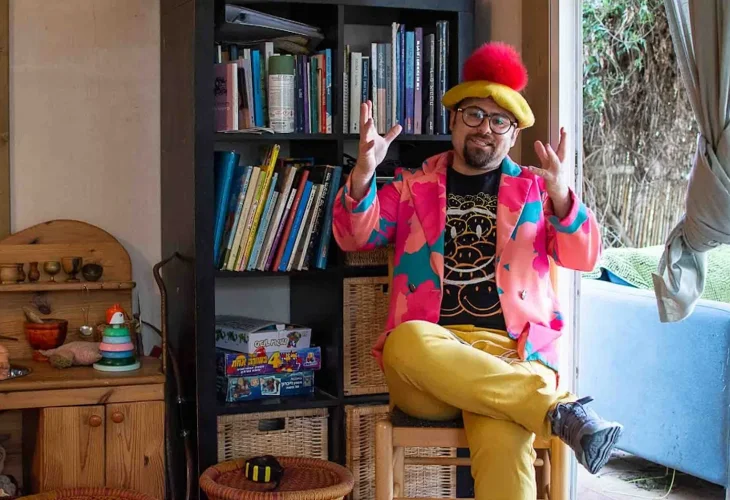 (Photos: Reuma Geva)
(Photos: Reuma Geva)Every Adar, we increase our joy, but for Hananel Amitai, known as "Dr. Laugh," laughter is not just for this season but a way of life. Amitai, who has traveled the length and breadth of the country with his performances, has turned laughter into a profession, reaching diverse audiences from children and adults to the elderly, spreading the message of joy and laughter. Amitai's mission is not just about bringing smiles to people but sowing laughter and happiness in the darkest places, where he sees the greatest importance in his work.
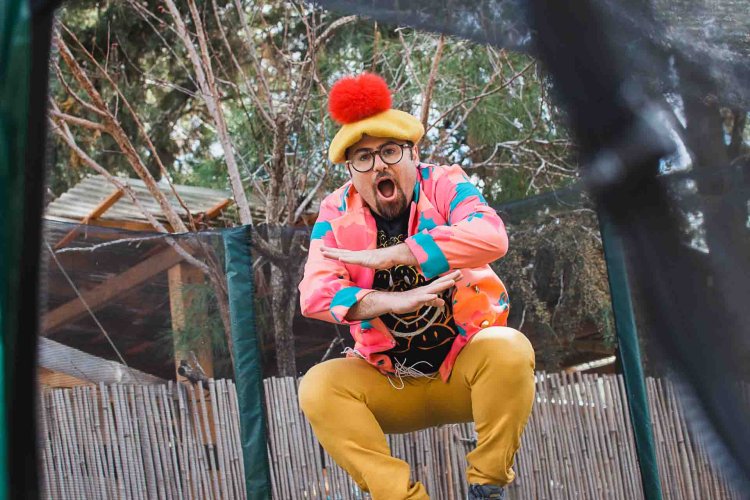 (Photo: Reuma Geva)
(Photo: Reuma Geva)"Simply to Bring Joy"
Amitai's personal life story is not without challenges, and he shares it openly to illustrate how laughter can serve as a tool for improving life quality.
"Ever since I was a child, I loved jokes, humor, and laughter," he shares, "but on the outside, I seemed like a regular kid, not particularly funny. When I was 13, an attack occurred in Otniel, which I witnessed. I saw horrific scenes, leading to anxiety, anger outbursts, and a very tough period. As a result, something in the openness and natural freedom I had closed off. I repressed everything I went through, laughed at everything, but my heart was shut."
When Amitai joined the army, he was initially placed as a combatant. "But I quickly realized I’d rather be a comedian," he notes. "Even though it’s not common, I was allowed to do a type of theater in the army, performing for soldiers and uplifting their spirits."
Shortly after his military service, Amitai began working as a medical clown at Hadassah Ein Kerem. "I went through the toughest wards, trying to bring joy to adults and children battling illnesses, helping them to forget their struggles, worries, and pain," he recalls.
During those days, he entered the oncology ward and met Ohad, a five-year-old in very poor condition. "I especially connected with him," he recounts, "and every time I succeeded in putting a smile on his face or even made him laugh, it made my day worthwhile. After a few months, when I came to visit, I was told Ohad was discharged. I asked: 'How is that possible?' and the nurses told me: 'The child beat cancer, he’s in recovery.' About a year later, I was invited to Ohad's birthday at his home. I arrived and couldn’t stop crying from excitement. I saw a regular six-year-old, like any other child. His father pulled me aside and said: 'If you hadn’t come to us a year ago, it’s questionable if Ohad would still be with us today.'
"That sentence struck me unusually," Amitai reflects, "because I felt like Hashem was speaking to me, saying: 'It’s not for nothing you’re short like a child at 5 feet tall, or that you’ve gone through what you did, but there’s a purpose - to go out into the world and remind people to laugh, not just when life's good, but also when it's less so.' Since then, that’s exactly what I’ve been doing for 14 years, performing for different audiences, simply trying to make people happy and laugh."
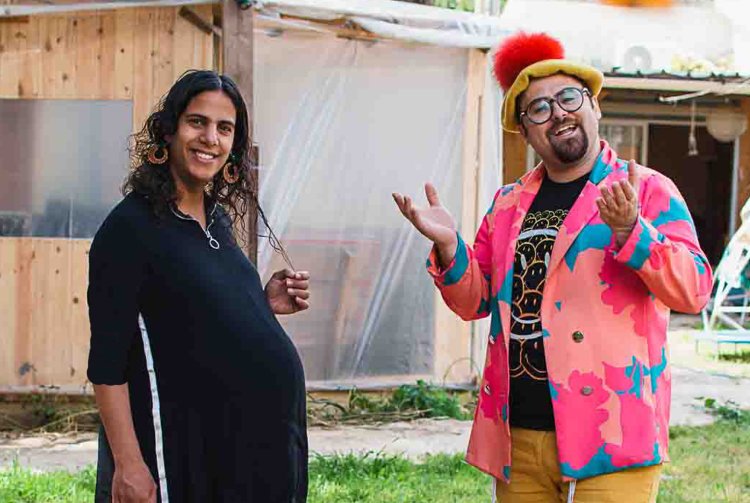 (Photo: Reuma Geva)
(Photo: Reuma Geva)The Path to Laughter
The mission, as one can imagine, is not necessarily easy. "Sometimes you encounter people who have something stuck, like a blockage that prevents them from opening up, and it seems laughter is their enemy," Amitai says. "Over time, I’ve learned not to stress about it; it's simply a new challenge each time to see if I can at least make them smile. And *Baruch Hashem,* usually even the toughest eventually melt."
But how do you do it? What's your secret?
"Hahahahahahaha," Amitai suddenly bursts into a deep, hearty laugh. "Laughter is contagious," he explains. "That’s the first thing I do, simply laugh myself, and even if they aren’t laughing yet, it at least thaws and releases something within them. Additionally, I use various improvisation methods, like teaching people to speak gibberish: 'Kadesh-tash Ksidishis-no-no...' he demonstrates humorously, "and I also improvise on other topics – like discussing both for and against marriage in one breath. I might say to the crowd: 'Let’s talk about relationships - they’re the greatest gift, really just terrible, the deeper you go, the more you understand that real life is like hell because you’re always arguing and don’t know how to admit things, and you’re walking around serenely at home thinking it’s great you married the wrong woman.'"
Amitai pauses for a moment, allowing me to finish laughing, before clarifying: "Laughter sometimes arrives spontaneously, but there’s a kind of science and planning behind it too. It’s something you learn as a profession in theatrical schools, part of improvisation and comedy training, which I also attended. And, of course, above all, I always pray to Hashem to assist me in making the people of Israel laugh and fulfill my mission."
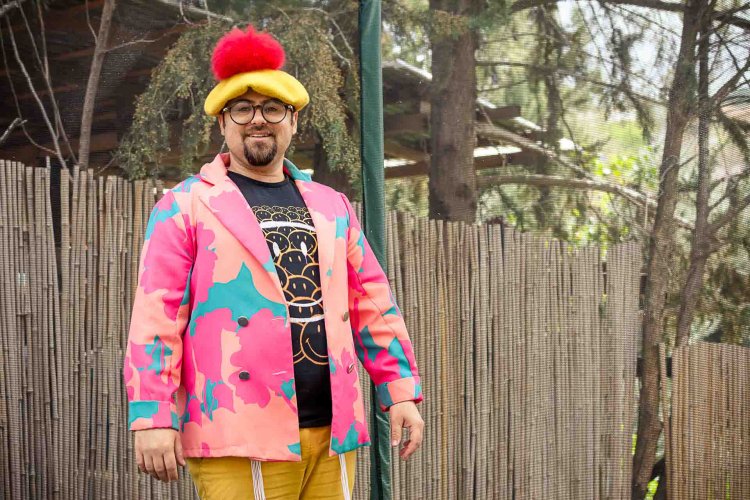 (Photo: Reuma Geva)
(Photo: Reuma Geva)A Mission of Laughter
Over the last year and a half, since the outbreak of the war, laughter has not been trivial. We all find it challenging to laugh as though there are no worries. What’s been your experience during this time?
Amitai seems to understand this subject well. "I encountered it closely on the fourth day of the war," he notes, "I was at a funeral for a friend who was murdered in the southern massacre, and right after I got into my car to leave, a reservist soldier called, asking: 'come bring joy.' I was still teary and painfully replied: 'Do you know where I am? I'm in a cemetery, why don’t you come cheer me up?' At that moment, I didn’t believe I would return to cheering others and laughing, and indeed, for the first months, there wasn’t much demand for it. But over time, I discovered how much people needed laughter now more than ever, and I also learned something new – laughter does not contradict sorrow, and if you give yourself an hour of laughter and freedom, it doesn’t mean you don’t feel pain and grief for the situation. It's much like how a labor room, filled with physical pain, can exhibit the greatest joy and happiness. They don’t contradict one another.
"So yes, gradually I returned to performing, among others for soldiers who experienced intense traumas in the war, and even for bereaved families. Recently, I performed for parents whose children were murdered in Nova, and one mother came to me afterward and said: 'This is the first time I've laughed since my son was killed.' My reaction was: 'If for this alone, I came into this world – I'm completely content,' and it moved me immensely."
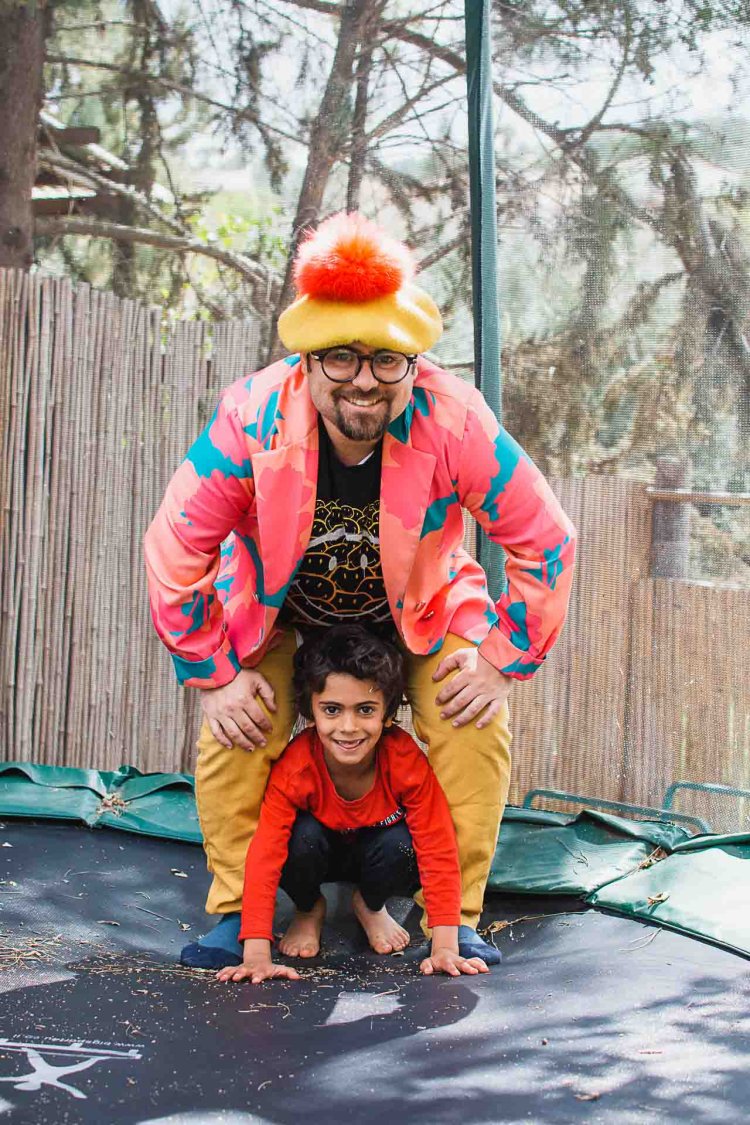 (Photo: Reuma Geva)
(Photo: Reuma Geva)A Happy Home, a Joyful Family
But more than Amitai influences those around him, he impacts himself and his family. According to him, this is the greatest bonus of his work. "I am happily married to Renana, and we have two wonderful children," he shares. "After our youngest son was born, my wife had a dream to be a surrogate for parents unable to naturally bear children, which she fulfilled, giving birth to a baby girl last Purim. It was an especially joyous holiday; we didn’t need to search for ways to rejoice or be entertaining; it was just joyful by nature."
Interestingly, Amitai notes they maintain contact with the baby's parents, meeting occasionally. "Renana runs a daycare center, also a joyful and humorous woman, but our humor is of a different sort, and we laugh a lot at home."
And what about the kids? Are they particularly happy too?
"Yes, they don’t have much choice," he responds. "Even when our eldest son challenges or complains, I tell him: 'You have to laugh because your father is Dr. Laugh; you have no other choice,’ and he really does laugh."
Who came up with the nickname Dr. Laugh?
"The nickname was born during the pandemic. Surprisingly, I had many show requests during that time, all done remotely over Zoom. One night, I simply dreamt they were calling me Dr. Laugh, and since then, that’s my name."
It sounds impossible – to laugh over Zoom...
"Of course, it’s possible to both laugh and be amusing. I still have a large group of friends at the ‘Beit Midrash for Laughter.’ We meet remotely and learn to laugh through sources found in the weekly Torah portion and Judaism. The more you dive into the Torah, the more joy you find; it serves as inspiration for joy and laughter."
Nowadays, after 14 years of endless laughter, Amitai mentions he also has plans. "I see myself expanding the Beit Midrash and adding more and more members. Moreover, I aim to train as many people as possible as laughter coaches to engage in this important mission, because it’s sorely needed, and we all simply need to laugh."

